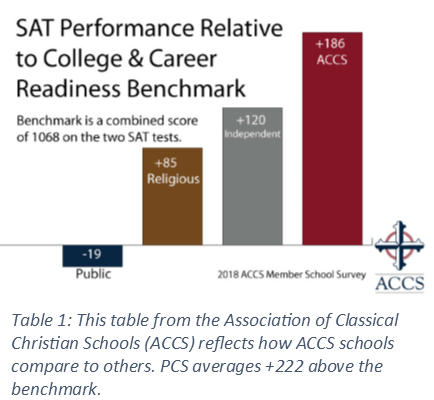Classical Christian Education
A Solution to Underachieving Schools (Part 1)
Have you ever seen a school advertise itself as an “underachieving school?” Likely not! Instead, how often do schools use the word “excellence” while describing their programs? Meanwhile, how often do we hear about the dilemma of underachievement in modern education? Derek Bok, former Harvard President, addresses this challenge at the undergraduate level in his book, Our Underachieving Colleges: A Candid Look at How Much Students Learn and Why They Should Be Learning More. The distinct approach of Classical Christian education addresses Bok’s concerns prior to college, at the K-12 level.
The “Why” Before the “How” and the “What”
The answer to solving education’s underachieving problem starts by asking, “Why does your school exist?” Simon Sinek, in Start with Why, emphasizes that the “why” is more important than the “what.” People are inspired by the “why!” In his “Golden Circle,” Sinek emphasizes that people don’t buy what you do, they buy why you do it. Inspired organizations lead, think, act, and communicate from the inside out, from the “why” to the “how” to the “what.”
In education, the “what” is more closely connected to the “why.” It is what Independent School Management calls “the portrait of a school’s ideal graduate.” Since a school’s product is the impact it desires to have on its students, Sinek’s “Golden Circle” can be rearranged from the “why” to the “what” to the “how.” To avoid underachievement, a school must stay focused on its purpose and intended goals for its students.
Classical Christian education is rooted in the great commission (Matthew 28:18-20), existing to be a part of God’s plan to build His kingdom. Our mission and portrait of a graduate are directly tied to impacting the lives of the next generation for the sake of His name. Thus, by focusing on our purpose and goals, we chart ourselves on a clear course and are inspired not to settle for mediocrity.
“Any useful discussion of undergraduate education must begin by making clear what it is that colleges are trying to achieve.” Derek Bok, Our Underachieving Colleges, p. 58
Providence Classical School: Its Mission and Portrait
To illustrate how a classical and Christian school approaches this concept, let’s consider Providence Classical School’s mission as well as its portrait of the ideal graduate. The school exists to be a Christian school using the classical model to train students to impact their culture for Christ. The mission statement uses four key elements to describe what it is trying to achieve.
First, the school is Christian. It is an imperfect school that is rooted in the truth that God redeems sinful people by His grace established in the death, burial, and resurrection of Christ. Ultimately, this leads the school to seek to be Christ-centered in all that it does, not simply adding a chapel or religion class to its curriculum.
Methodologically, PCS uses the classical model. By using the model responsible for shaping all of western civilization, it addresses many of the concerns that Bok mentions in his book (this will be discussed in future posts). With a clear commitment to a methodology, PCS goes beyond the mere regurgitation of facts to provide students with tools for a lifetime of learning.
The third key element emphasizes the purpose clearly, “to train students.” While being Christ-centered, students are the focus. PCS exists for the purpose of training the next generation. Since students spend more than seven hours a day at school, the faculty, staff, and coaches are most critical to fulfilling this purpose. While the liberal arts and sciences are taught, teachers also impart their lives as well as their worldview.
Lastly, the training has a desired end. The object is to train students to impact their culture for Christ. No matter the sphere that students enter after graduation, the end result is to train them to live authentic Christian lives and hence influence their culture for God’s kingdom.
If such a mission is fulfilled, the end result will be students who are known for their character, knowledge, discernment, and communication. Graduating such an ideal student is a tall task that requires commitment from all parts of the community: Board, faculty, staff, students, parents, and friends of PCS. Interestingly, each of these aspects of the ideal graduate addresses Bok’s concerns with what’s wrong in underachieving colleges.
Classical Christian education provides a solution to the plight of underachieving education. Stay tuned as forthcoming blogs will continue this discussion.
If you would like to schedule a tour to see Providence Classical School’s “why,” “what,” and “how,” click here.









